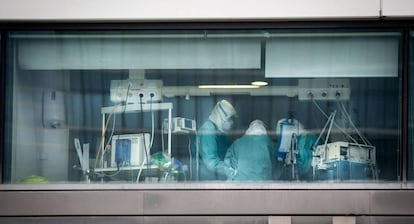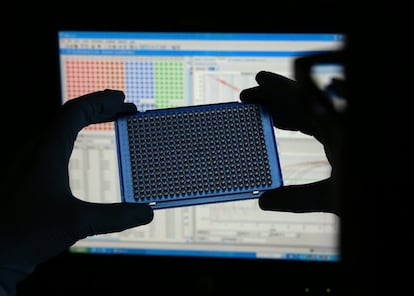Lack of testing hampering Spain’s efforts to slow coronavirus outbreak
Medical associations warned weeks ago that more resources were needed to diagnose cases of Covid-19, a process that has proven to help curb the number of infections in countries such as South Korea

Health authorities have warned that Spain does not have the resources to diagnose all cases of the novel coronavirus. The regional government of Madrid, which has been hardest hit by the pandemic, raised the alarm last Thursday, and the national Health Minister Salvador confirmed the problem on Tuesday.
Fernando Simón, the director of the Health Ministry’s Coordination Center for Health Alerts, said on Tuesday that it was a “logistics issue” and maintained the problem would be resolved within “two or three days.”
We cannot stop this pandemic if we don’t know who is infectedTedros Adhanom Ghebreyesus, head of the World Health Organization
According to sources consulted by EL PAÍS, the lack of testing could hamper the efforts to combat the Covid-19 pandemic, which has so far left 13,716 people infected and 598 people dead in Spain. While the lockdown implemented on Saturday by the Spanish government has mitigated the problem, completing as many tests as possible has proven to be key to slowing the spread of the outbreak in countries such as Germany and South Korea, with 15,000 tests done every day at the height of the crisis in the latter country.
“Isolation reduces the circulation of the virus, but knowing who is infected continues to be important,” said the head of a microbiology unit at a large public hospital. “Every diagnosis is a chain of infections that does not reach a senior center. It avoids hospitalizations and, ultimately, deaths.”
Hospitals and scientific associations have warned about the need to complete more tests. On February 26, the same day the first locally transmitted case of coronavirus was diagnosed in Spain, the leaders of Spain’s large public hospitals told EL PAÍS that they had informed the Health Ministry that “more tests had to be done, and as soon as possible.”
“The system was not prepared”
“The [healthcare] system was not prepared for the seriousness of what was coming,” said the head of the infectious disease department of a hospital in Spain’s southern region of Andalusia. “Up until at least a week ago, we weren’t able to do a PCR [a diagnostic test] for coronavirus without asking for authorization. I could order a PCR for the flu, but not for the coronavirus.”
Four medical associations (clinical microbiologists, intensivists, internists and emergency physicians) sent a letter to the Health Ministry on March 9, which stated that adopting the necessary measures to “guarantee the early identification (and isolation) of the highest number of cases” must be considered a “top priority,” and highlighted the need to strengthen Spain’s “diagnostic strategy and capability.”
“The problem was that at the time the Health Ministry and the regional government did not have much margin to respond quickly,” said the source from Andalusia. “Everything was designed to confront a limited number of cases and laboratories were not equipped with the resources to deal with a possible exponential rise in demand. Nor were the logistics of collecting thousands of tests from home taken into account.”

The head of the World Health Organization (WHO), Tedros Adhanom Ghebreyesus, made it clear on Monday that testing for the coronavirus was key to tackling the crisis. “We cannot stop this pandemic if we don’t know who is infected,” he said at a public briefing. “We have a simple message for all countries: Test, test, test. Test every suspected case. If they test positive, isolate them and find out who they have been in contact with two days before they developed symptoms and test those people, too.”
The WHO recommends that even people who show no symptoms should be tested, but this measure has not been included in Spain’s current guidelines, which state that “diagnostic tests for coronavirus will not be routinely performed on contacts” of patients. Despite this discrepancy, Fernando Simón maintained on Tuesday that “the WHO recommendations are the same ones that Spain has been following for some time.”
PCR tests
Microbiologists in Spanish hospitals have been using a diagnostic test called Polymerase chain reaction (PCR) to identify coronavirus cases. The semi-automatic testing kits are not, however, available at all health centers. The PCR identifies whether the genetic code of the virus, which was published by Chinese scientists in mid-January, is present in a patient’s sample. In an ideal situation, where one test is analyzed at a time, it would take a laboratory four-and-a-half hours to receive a result. But because many samples are being analyzed at once, the process takes between six and six-and-a-half hours.
In large hospitals in Madrid, between 200 and 400 test results are being processed every day, according to Rafael Cantón, the head of microbiology at the Ramón y Cajal hospital. “We would like to test everyone but with the diagnostic capability and number of kits we have, that is not possible. It’s not viable,” he said.
Many of the PCR diagnostic kits are made in other countries but there are biotechnology companies with production plants in Spain. CerTest, for instance, is located in San Mateo de Gállego, in the northeastern province of Zaragoza. The company makes 40,000 tests a day, but Spain has only done 30,000 since the beginning of the crisis. “As much as we would like to, there are no supplies of the other components that are needed, like the extraction kits,” said Nelson Fernandes, the director general of CerTest, who explained that these kits are not made in Spain. Other items such as swabs and the liquid used to transport the sample have also begun to run out.
Faster testing
A faster method to test for the novel coronavirus is set to be rolled out this week in a bid to identify mild cases. Simón explained on Wednesday that this is likely to “increase substantially” the number of coronavirus infections in Spain.
br/>
The Health Ministry, however, did not specifically clarify what the new method involved or how it differs from the PRC test. Other countries have begun using serological testing which is much faster, but as Simón admitted, also much less accurate.
Since the coronavirus outbreak escalated two weeks ago, tests have only been done on serious cases, especially vulnerable people, and health workers with symptoms.
English version by Melissa Kitson.
Tu suscripción se está usando en otro dispositivo
¿Quieres añadir otro usuario a tu suscripción?
Si continúas leyendo en este dispositivo, no se podrá leer en el otro.
FlechaTu suscripción se está usando en otro dispositivo y solo puedes acceder a EL PAÍS desde un dispositivo a la vez.
Si quieres compartir tu cuenta, cambia tu suscripción a la modalidad Premium, así podrás añadir otro usuario. Cada uno accederá con su propia cuenta de email, lo que os permitirá personalizar vuestra experiencia en EL PAÍS.
¿Tienes una suscripción de empresa? Accede aquí para contratar más cuentas.
En el caso de no saber quién está usando tu cuenta, te recomendamos cambiar tu contraseña aquí.
Si decides continuar compartiendo tu cuenta, este mensaje se mostrará en tu dispositivo y en el de la otra persona que está usando tu cuenta de forma indefinida, afectando a tu experiencia de lectura. Puedes consultar aquí los términos y condiciones de la suscripción digital.








































